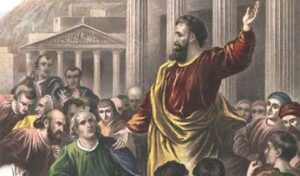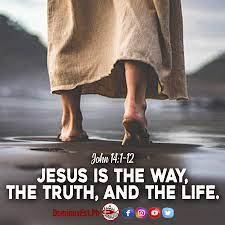DOCTRINE AND FAITH
(Isaiah 22,19-23; Psalm 137 (138); Romans 11,33-36; Matt 16,13-20; 21st Sunday of Year A, 27th August, 2023)
“How rich are the depths of God—how deep his wisdom and knowledge! How unfathomable are his judgments and unapproachable his ways! In fact, who has ever known the thought of the Lord? Or who has ever been a counselor to him?” (Rom 11, 33-34). This exclamation of Paul puts us in the right way before the Lord and his word. We can only acknowledge our poverty: admit our non-knowledge; confess the impossibility of welcoming and understanding (in the original sense of the verb: grasping and containing) all the richness of God’s wisdom. Giving up all pretense, we prepare ourselves to stand before him in the silence that adores, in the word of praise that acclaims and glorifies; just as the Apostle invites us to do: “To him be glory for ever. Amen” (Rom 11, 36). If this is to be our way of standing before God, we must at the same time contemplate, with surprise, how God himself disposes himself towards us. The Word that we hear today also tells us about this, revealing to us not only his unfathomable transcendence but also his very confident condescension.
.png) The mystery of God, in fact, opens up and reveals itself, as Jesus reminds Peter, announcing to him the beatitude of the believer: “Blessed are you, Simon, son of Jonah, for it is not flesh and blood that revealed it to you, but my Father who is in heaven” (Matt 16,17). His ways, though inaccessible, open to welcome our following him as we walk along in them, as the disciples do, who following the path of Jesus, arrive in Caesarea Philippi for the encounter with him that ignites in them a deeper knowledge of the secret that is hidden in his person. If no man can assume upon himself the role of “adviser of God”, God, nevertheless entrusts to our frail humanity (of flesh and blood) his Kingdom, with the same trust with which, in the first reading, he places the key of the house of David on Eliakim’s shoulder. Now, even the key to the Kingdom is entrusted to Peter by Jesus: “To you I give the keys of the kingdom of heaven” (Matt 16,19). God reveals himself, not because we have the ability to penetrate his secret, but because, despite our poverty (indeed, precisely because of it) he confidently gives us the mystery of the Kingdom. What Jesus exclaims at the end of chapter 11 of Matthew is also true for Peter: “I praise you, Father, Lord of heaven and earth, because you have hidden these things from the wise and learned and revealed them to babes” (Matt 11,25). The littleness of faith, to which God is pleased to manifest himself and from which he wishes to allow himself to be encountered, has some typical features necessary for an encounter to take place. Among the many, there is one, which weaves together personal experience and community experience. Faith is personal, but not solitary: one does not believe alone. It is personal, because he asks to let himself be questioned in the truth and in the depth of his own life: “Who do people say that the Son of man is? But who do you say I am?” (Matt 16,13.15). How delicate and at the same time decisive is this passage from “people” to “you”, until it reaches “you”! You, you who are listening to the Gospel now, who do you say I am? God reveals himself, not by packaging answers, but by arousing questions, opening paths of research, which must be personal, since one cannot be satisfied with what others have said or are saying. The Lord's questions demand answers that establish a true relationship with him. It is in the truth of the face-to-face encounter that he shows his face, while he designs ours in a new way. “You are the Christ, the Son of the living God,” replies Peter. And in turn Jesus says to him: “You are Peter and, on this rock...” (Matt 16,16.18). “You are... You are...”.
The mystery of God, in fact, opens up and reveals itself, as Jesus reminds Peter, announcing to him the beatitude of the believer: “Blessed are you, Simon, son of Jonah, for it is not flesh and blood that revealed it to you, but my Father who is in heaven” (Matt 16,17). His ways, though inaccessible, open to welcome our following him as we walk along in them, as the disciples do, who following the path of Jesus, arrive in Caesarea Philippi for the encounter with him that ignites in them a deeper knowledge of the secret that is hidden in his person. If no man can assume upon himself the role of “adviser of God”, God, nevertheless entrusts to our frail humanity (of flesh and blood) his Kingdom, with the same trust with which, in the first reading, he places the key of the house of David on Eliakim’s shoulder. Now, even the key to the Kingdom is entrusted to Peter by Jesus: “To you I give the keys of the kingdom of heaven” (Matt 16,19). God reveals himself, not because we have the ability to penetrate his secret, but because, despite our poverty (indeed, precisely because of it) he confidently gives us the mystery of the Kingdom. What Jesus exclaims at the end of chapter 11 of Matthew is also true for Peter: “I praise you, Father, Lord of heaven and earth, because you have hidden these things from the wise and learned and revealed them to babes” (Matt 11,25). The littleness of faith, to which God is pleased to manifest himself and from which he wishes to allow himself to be encountered, has some typical features necessary for an encounter to take place. Among the many, there is one, which weaves together personal experience and community experience. Faith is personal, but not solitary: one does not believe alone. It is personal, because he asks to let himself be questioned in the truth and in the depth of his own life: “Who do people say that the Son of man is? But who do you say I am?” (Matt 16,13.15). How delicate and at the same time decisive is this passage from “people” to “you”, until it reaches “you”! You, you who are listening to the Gospel now, who do you say I am? God reveals himself, not by packaging answers, but by arousing questions, opening paths of research, which must be personal, since one cannot be satisfied with what others have said or are saying. The Lord's questions demand answers that establish a true relationship with him. It is in the truth of the face-to-face encounter that he shows his face, while he designs ours in a new way. “You are the Christ, the Son of the living God,” replies Peter. And in turn Jesus says to him: “You are Peter and, on this rock...” (Matt 16,16.18). “You are... You are...”.
.jpg) The meeting is not only face to face, but opens the space for a mutual new knowledge of the other and of oneself. While he gets to know Jesus' secret with new eyes, Peter discovers his own personal secret, regenerated by his encounter with Jesus. This personal “you”, in the authentic experience of faith, always opens up to an ecclesial “we”. In Matthew, Peter’s profession of faith is anticipated, in the episode of the calmed storm, by the unanimous faith of the disciples: “Those who were on the boat prostrated themselves before him, saying: “Truly you are the Son of God!” (Matt 14,33). The service that Jesus entrusts to Peter in Caesarea, in chapter 18 will be given to the community as a whole: “Truly I say to you: whatever you bind on earth will be bound in heaven, and whatever you loose on earth will be loosed in heaven.” (Matt 18,18). Peter needs the faith of his brothers, and his brothers need Peter's faith. God reveals himself to the little ones but to the little ones gathered in the community of brothers, who together, in the bond of communion, live, fight, pray, so that every man and every woman can be freed from the bonds of evil and bound to the Lord of life. Jesus promises Peter exactly this: the ties of evil and hell cannot prevail over the ties of ecclesial fraternity (cf. Matt 16,18-19). + John I. Okoye.
The meeting is not only face to face, but opens the space for a mutual new knowledge of the other and of oneself. While he gets to know Jesus' secret with new eyes, Peter discovers his own personal secret, regenerated by his encounter with Jesus. This personal “you”, in the authentic experience of faith, always opens up to an ecclesial “we”. In Matthew, Peter’s profession of faith is anticipated, in the episode of the calmed storm, by the unanimous faith of the disciples: “Those who were on the boat prostrated themselves before him, saying: “Truly you are the Son of God!” (Matt 14,33). The service that Jesus entrusts to Peter in Caesarea, in chapter 18 will be given to the community as a whole: “Truly I say to you: whatever you bind on earth will be bound in heaven, and whatever you loose on earth will be loosed in heaven.” (Matt 18,18). Peter needs the faith of his brothers, and his brothers need Peter's faith. God reveals himself to the little ones but to the little ones gathered in the community of brothers, who together, in the bond of communion, live, fight, pray, so that every man and every woman can be freed from the bonds of evil and bound to the Lord of life. Jesus promises Peter exactly this: the ties of evil and hell cannot prevail over the ties of ecclesial fraternity (cf. Matt 16,18-19). + John I. Okoye.
graphics by chukwubike
.jpg)



